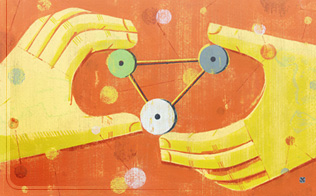About 10 years ago, biology entered betting season. An upstart scientist named J. Craig Venter jolted the genetics establishment by launching his own gene-sequencing outfit, funded by commercial investment, and setting off toward biology's holy grail—the human genome—on his own...
A comprehensive ethical approach is needed to more readily identify and address ethical challenges and foster a productive public dialogue about social implications, according to a new report.
The National Institutes of Health (NIH) said today it is providing $42 million to The Human Microbiome Project’s three large-scale sequencing centers. One of the centers is J. Craig Venter Institute in Rockville, MD…
Members of the biofuels industry are ready to meet the challenge of producing replacements for petrochemical fuels that will be cost-competitive and renewable, and will meet the increasingly stringent demands of the green revolution....
Algae-based biofuels hold enormous promise as an alternative transportation fuel, but investors had better have patience. …
[…] Chemists and biologists are thus pretty much on their own in figuring out how life started. For lack of fossil evidence, they have no guide as to when, where or how the first forms of life emerged. So they will figure life out only by reinventing it in the laboratory.
Chinese Academy of Sciences (CAS) launched its series report "Technological Revolution and China's Future-Innovation 2050" on June 10, 2009 in Beijing. The report produced a road map for China's science and technology development till 2050.
Biosecurity regulations are back on the table again, and revised policies could have broad implications for the entire scientific enterprise. In response to an Executive Order by President Bush on 9 January 2009, an interagency working group is reviewing all U.S. laws and regulations governing the conduct of research with biological materials that are potential security threats—so-called select agents.…
A new interactive map shows a growing landscape of synthetic biology activity throughout the United States and Europe.
Scientists have called it "junk DNA." They have long been perplexed by these extensive strands of genetic material that dominate the genome but seem to lack specific functions. Why would nature force the genome to carry so much excess baggage?
Synthetic biologists are a lot like children playing with Lego. But while a child uses plastic blocks to construct elaborate creations, synthetic biologists use genes and DNA to build new organisms and bacteria that create vaccines and biofuels and cure diseases…
The government of Alberta and private funders have given C$25.2 million ($22.1 million) to two new research programs that will study genomics to discover new ways to use microbes in energy production and new uses for plants in medicine and in industry, Genome Alberta said today…
BIO Honors Pioneer in Synthetic Biology Transforming Treatment of Malaria, Approach to Biofuels….
